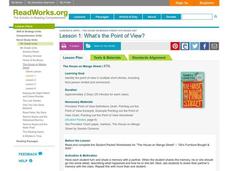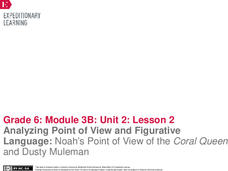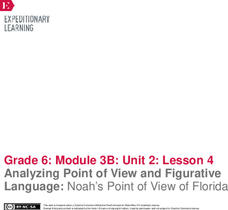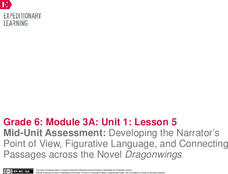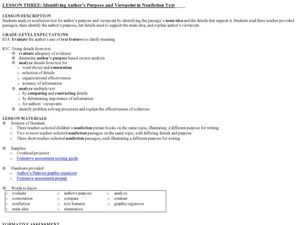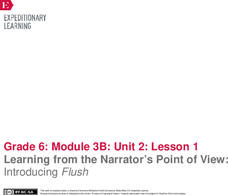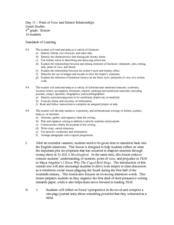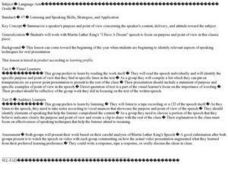Curated OER
What's the Point of View?
Sixth graders explain what a point of view is. They list two different types of examples of third person point of view and identify the difference between a third person limited and third person omniscient . Additionally, they read a...
ReadWriteThink
Teaching Point of View With Two Bad Ants
What better way to explain the concept of point of view than from an ant's perspective! After reading Two Bad Ants, pupils identify the point of view of the ants by studying the text and pictures. Then, they fill out a chart that...
Curated OER
Points of View
Cinderella is a classic love story when Cinderella is the protagonist—but what happens if a stepsister tells the story? Focus on point of view with a lesson plan about fairy tales and story elements. After reading a few familiar fairy...
EngageNY
Analyzing Point of View and Figurative Language: Noah’s Point of View of the Coral Queen and Dusty Muleman
Literally, what's the meaning? Scholars read pages seven through nine of Flush and discuss literal and nonliteral meaning with figurative language. Learners work in triads to identify and define unfamiliar words. They then complete a...
EngageNY
Analyzing Point of View and Figurative Language: Noah’s Point of View of Florida
Fishing for words. Scholars search for unfamiliar words in pages 27-29 of Flush, place them in their word catchers, and complete part of Noah’s Point of View graphic organizer. After identifying figurative language, learners analyze tone...
Curated OER
Call of The Wild
Prompt your class to interact with Jack London's Call of the Wild. By analyzing the events in the novel, middle schoolers discover how human experiences create who a person becomes. They critique and analyze the reading, focusing on...
Curated OER
Saturday Market by Patricia Grossman
Readers make personal connections to Saturday Market by Patricia Grossman and answer comprehension questions while reading the book. Comparing and contrasting the different characters in a Venn diagram leads to a kinesthetic activity...
Curated OER
Identifying Different Perspectives - Camilo's Drums
Explore differing points of view with your upper elementary and middle schoolers. Learners watch a video segment called "Ancestors Talk through Drums" and determine what perspectives are presented. Then, using the included worksheet,...
Curated OER
Determining Author's Point of View: The Sneeches
Determine the author's point of view in a text. Young readers read Dr. Seuss' The Sneeches and identify the author's purpose in the story. They identify persuasive techniques in writing, asking and answering questions to better...
Literacy Design Collaborative
Identifying Points of View through Character Responses in R.J. Palacio's "Wonder"
Readers examine the book Wonder by R.J. Palacio to determine how characters respond differently to situations and events. Readers annotate and analyze the text and carry out group discussion using accountable talk. They work in small...
Curated OER
Fractured Fairy Tales
Through reading and writing, learners explore common elements found in fairy tales. After discussing traditional fairy tales, class members listen to The True Story of the 3 Little Pigs by John Scieszka, a hilarious retelling of the...
Curated OER
Post-Colonial Writers Unit
How do cultural and historical background impact thought? To explore this essential question, class members view of portion of the film, The Passage to India, read an excerpt from The Magician’s Nephew, and Nissim Ezekiel’s poem, "In...
EngageNY
Mid-Unit Assessment: Developing the Narrator’s Point of View, Figurative Language, and Connecting Passages across the Novel Dragonwings
Let's get creative! As part of a mid-unit assessment, scholars create a piece of artwork illustrating the theme from Laurence Yep's novel, Dragonwings. Additionally, pupils use a graphic organizer to identify figurative language in the...
Curated OER
Genre Lesson: Biography/Autobiography
Practice distinguishing biography from autobiography through point of view. Tell a brief story of your morning. Have a class member retell the story to you (using second person). And have another retell the story to the class (using...
Curated OER
Identifying Author’s Purpose and Viewpoint in Nonfiction Text
Why do people write books? Pupils discover how to identify the author's viewpoint. They read non-fiction passages their instructor selects (the plan has the class look at nonfiction children's picture books), and then identify the...
EngageNY
Learning from the Narrator’s Point of View: Introducing Flush
It is all down the drain. Scholars read chapter one of Flush and write any unfamiliar words in their word catchers and identify the narrator and point of view of the story. Pupils complete a point of view anchor chart and use Thought,...
Curated OER
Point of View and Mentor Relationships
Tenth graders analyze the role of mentors, point of view, and prejudice using the texts of To Kill a Mockingbird and Maya Angelou's I Know Why the Caged Bird Sings. In this literature analysis lesson, 10th graders review Scout's...
Curated OER
Point of View
Fifth graders identify first and third person points of view in literature. In this point of view lesson students compare the point of view in different pieces of literature, some telling the same story. Students write a first-person...
Curated OER
Changing the Point of View
Fourth graders identify the point of view. In this point of view lesson students compare and contrast the point of view from third person omniscient and first person. Students rewrite a paragraph in an alternative point of view.
Curated OER
Martin Luther King's "I Have a Dream"
Dr. Martin Luther King's "I Have a Dream" speech provides the text for a study of how to analyze a speaker’s content, delivery and attitude. Visual learners identify specific lines that reveal King’s purpose and point of view while...
K20 LEARN
You Think You Have Problems: Perspective in Multi-Genre Literature
Young scholars are asked to reflect on how personal experiences might influence points of view and perspectives. They read poems and biographies of the poets and then match the poem to the poet. To justify their matches, learners...
Curated OER
Things Aren't Always What They Seem
Students use video and the Internet to make predictions, draw conclusions, determine conflict and point of view while reading a short story. In this short story analysis lesson, students watch a related video and complete a prediction...
Curated OER
Abigail in Mourning
People deal with grief in different ways. The series of Abigail Adams' letters in this lesson reveals how she dealt with losing her mother, father, and community members. The included worksheet helps young scholars identify the tone and...
Roy Rosenzweig Center for History and New Media
War and Poetry
A band of brothers or the Devil's agents? Nobel warriors freeing the oppressed or mercenaries working for the military/industrial complex? Groups examine poems from the Civil War, World War I, and World War II to determine the poets'...


